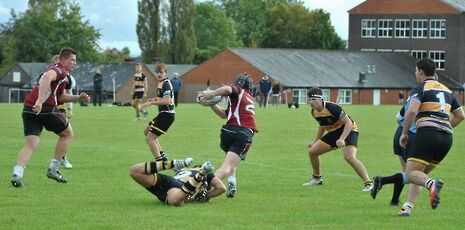Is rugby as gay as it looks? A CURUFC player’s perspective
With the issue of homophobia in football hitting the headlines, one player reveals his experience as a gay man in the world of rugby

Rugby, taken out of its sporting context, is about as homoerotic as a platonic activity can get. Yet somehow, the game where thirty muscular, (mostly) in-shape men hug each other has the reputation of being the pinnacle of masculinity. Lad culture and rugby players go hand-in-hand. One would presume the LGBT+ community was a foreign concept to these patriarchy-upholding brutes. But from my experience, that’s the opposite of the truth.
I became obsessed with rugby at the same age I began to realise I was gay: 11. The two went together quite nicely – my puppy fat and inner aggression could be tamed by running into people. I became quite good at this and, by the age of 15, I was playing for my school’s first team, the peak of grammar school social recognition. I was very lucky to have this social capital to protect me when rumours emerged that I was gay.
Enough of my self-indulgent coming out story. (If you didn’t know, I’m gay and play rugby #niche)
The only bit of in-game homophobia that has ever been directed at me came in one of my first XV games when the opposition hooker emerged from a scrum and called me a “f***ing f*ggot”. Taken aback, and too knackered to acknowledge this, I began to jog away before the game was stopped as our prop took a slightly more proactive approach and throttled the abuser. It was this reaction which has epitomised my relationship with homophobia: in rugby, your teammates have your back.
It sounds cheesy, but while you’re in a rugby team, you’re in a family. The infamous socials are all part of developing this familial relationship. You have to be prepared to get beaten up for the man beside you – that requires a pretty strong bond between teammates. For the family to function, you have to embrace every individual, and trust me, there are some weird blokes. So, although scary, coming out isn’t all that controversial and I’ve only ever been greeted with interest and respect.
For one reason or another, the LGBT+ community isn’t particularly visible in sport. Because of this, I get asked a lot of questions from some of the players who have had less exposure. My favourite recent one has been: “Do you watch gay porn? Because I watch straight porn, but I just look at the girl.” In fairness to the man, he was very drunk and I think on sober reflection he could have answered the question himself.
This innocent ignorance does filter through to what I would refer to as ‘lazy homophobia’. General “locker room banter”, to quote Mr Trump, is omnipresent – like calling someone gay for not enjoying the defensive aspect of the game. Comments like this don’t make someone homophobic, but they do paint an image of an unwelcoming environment, which can make it very intimidating to come out to people – particularly if those around you are older (and bigger).
I think it’s a shame that flippant comments like this give the impression that rugby is not a sport for all sexualities because, while it may seem discouraging from the outside, homophobia, from my experience, is not particularly apparent in a team.
A major reason for this is the high-profile openly gay individuals who are beginning to bring rugby’s hidden diversity to light. Nigel Owens, who is widely recognised as one of the best referees in the world, is openly gay and has been vocal on how the rugby world has been hugely accommodating. He has, however, also recognised that there is always going to be that one percent of people who are not accepting. It is the sport’s responsibility to positively promote anti-homophobia, and anti-bullying in general, so that the majority of people who are accepting have a louder voice than those who protest.
So to sum up, I’ve been very lucky. At school and at university, the rugby team has been where I have felt I could be myself the most. I realise this may not be universal, but I do get the impression that rugby, in general, is a surprisingly liberal sport
 Features / Beyond the porters’ lodge: is life better outside college?24 February 2026
Features / Beyond the porters’ lodge: is life better outside college?24 February 2026 News / Cambridge academics sign open letter criticising research funding changes22 February 2026
News / Cambridge academics sign open letter criticising research funding changes22 February 2026 Theatre / Footlights Spring Revue? Don’t Mind if I Do!25 February 2026
Theatre / Footlights Spring Revue? Don’t Mind if I Do!25 February 2026 News / Cambridge and Manchester Universities meet for innovation partnership26 February 2026
News / Cambridge and Manchester Universities meet for innovation partnership26 February 2026 Fashion / The evolution of the academic gown24 February 2026
Fashion / The evolution of the academic gown24 February 2026









![How to Create an Attractive Freelancer Portfolio [5 Tips & Examples]](https://www.varsity.co.uk/images/dyn/ecms/320/180/2026/02/vitaly-gariev-ho2tNOWZYXM-unsplash-scaled.jpg)